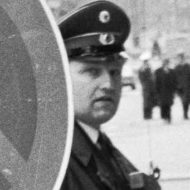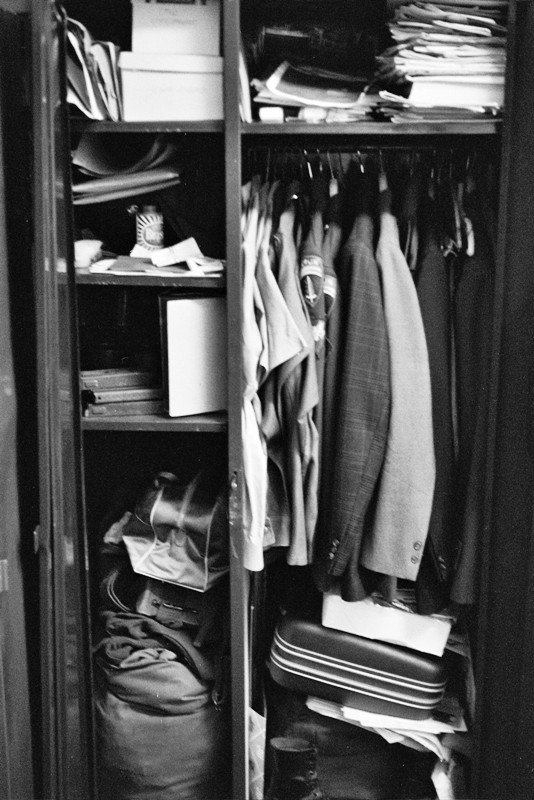
Many readers will recognize the vignettes in this story, because they have had parallel experiences.
CLOTHES MAKE THE MAN?
by R. W. Rynerson
Do the veterans reading this recall how people changed their perceptions of you as you changed your clothing from uniform to civvies or back again? No Berlin veteran who stood at a border crossing in a U.S. Army uniform can forget the look of joy or relief on faces of people leaving the East when they recognized their first American soldier. Of course, men and women are reminded of how clothing signals things about us from the time that we are kids, but most of us never wore uniforms daily until we were in the U.S. military. Plunged into a foreign culture, the peculiar effects on other people of changing our clothing became a subject of discussion– even concern. In one situation, we were celebrities, in the next, the same clothing made us accepted in the crowd.
Everyone who goes through basic training learns that certain fashion critics, disguised as drill sergeants, can tell a great deal from whether one’s brass is aligned on lapels properly. Just when this becomes almost second nature for us, we are confronted by the civilian world. And just when I began to get used to U.S. civilians’ 1969 reactions to my uniform, I ended up in Berlin.
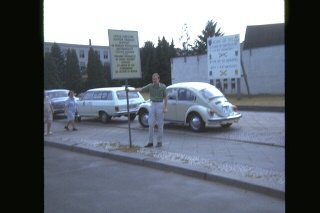
I arrived with only one civilian shirt– as with many other soldiers of ’69, I was sure that I was going to Vietnam, so had seen no reason to drag around a lot of civvies, especially for winter weather. The shirt, along with khaki pants, had seen me through leave in New York City. It got me through weekend outings in my new world of West Berlin, as seen in the accompanying snapshot (the sign warns Soviet military mission vehicles against driving on this street). My folks bundled up a package of warm stuff from my closet at home, but there was a time lag for delivery of this CARE package.
In the meantime, I wanted to go to hear the Berlin Philharmonic at one of its low-price summer concerts– what to wear? I put on my dress greens and headed to the orderly room to sign out.
“You’re going downtown dressed like that??? Man, they will BEAT YOU UP!” A couple of younger guys in loud sport shirts and jeans were there to sign out for the “Q-damn”, their short cropped hair showing signs of hair cream. “If you dress like that, they’re gonna know you’re an American right away!” I explained that even though the symphony was at the end of Potsdamer Strasse, the same street that they were actually heading to, that the people at the “Circus Karajani” would be unlikely to attack me physically. Perhaps, I imagined, someone would toss off a scathingly witty bon mot at my expense, but unless they did it in English, I did not know enough German then to be offended.
Of course, everyone was courteous. Not only that, but in the oxygen-tank level of seating, I met a Free University grad student who I was able to later call on for valuable insights into Berlin life and language. Still, as I sat in my cheap-seat perch, looking down over the glamorous people below, the thought struck me that thirty years earlier this room would have glistened with dress uniforms. Now, in the ongoing irony of history, the only one in a uniform was this American Spec 4.
The CARE package arrived, and another paycheck, too. I headed downtown to buy a German wool suit for the oncoming winter. The tailor refused to fit the pants snugly enough for me.
“Mehr bier, mehr kartoffeln!” He patted my tummy, to indicate that I should grow into his suit. It took me twenty years to do that.
Bit by bit, given my ancestry and a new plainclothes assignment that permitted a bit of sideburns and a German haircut, a new phenomenon appeared. People began guessing unsolicited things about me. Little old ladies who had a choice of a couple of German youths attired in neo-hippy style, with long, dirty hair, versus the nice, clean-cut young man in the sport coat and tie would choose to ask me for directions. You can imagine their disappointment when they discovered that they had picked a GI, with a limited German vocabulary.
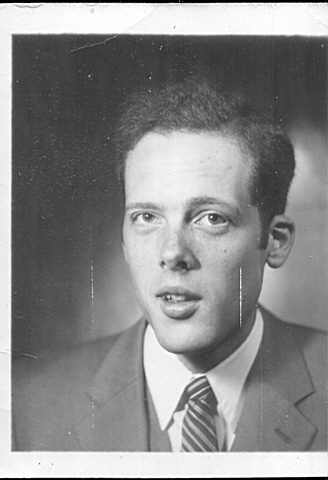
Germans had a particular tendency to want to play the “aha, gotcha!” game of identifying foreigners or people from other German speaking areas. Until 1999, I had supposed that this came from the wartime experience and the subsequent occupation. However, in that year I ran across a 1920 book by a soldier of the American Expeditionary Force who took a “European-out” to hike across 1919 Germany. He reported the same phenomenon.
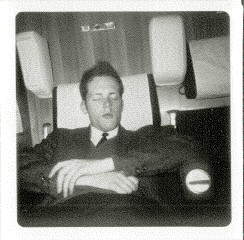
Being an Oregonian, from the land of Pendletons, White Stags and Jantzens, I had acquired clothing that was comfortable in cold, wet weather. (As shown in the snapshot, taken as I enjoyed a snooze on the Deutsche Bundesbahn’s Rheingold in April 1970. Tweed coat, sweater, tie cinched around the neck to keep out rain, snow, chill.) This escalated the confusion, as Germans recognized from my accumulated strassendeutsche that I was not a German, and therefore, must be…. aha! British! Uh, no….. jolly good guess, though! As a variant of this, one waiter in Hannover insisted that I must be Swedish. I gradually learned that most Americans who spoke this level of German had studied it in school, and sounded more formal than I did.
Once established that I was an American– and sometimes it seemed that they were humoring me because really they still thought that I was British– they assumed that I was an officer. Uh, nein, ich bin Unteroffizier! Reasons for assuming that? I was older, having graduated from college before being invited to enlist or be drafted.
“Oh, a university diploma? Why are you not an officer?” Then it was necessary to explain about the U.S. mass education system.
“You’re not a soldier, you are a policeman!” At a rundown hotel near the Hauptbahnhof in Frankfurt, a desk clerk took confusion to the next step, insisting that my Army identity card must be fake. It was the sport coat and tie again. It appeared that the film noir hotel needed a policeman more than it needed one more GI, but a lot of verbal wrangling finally got me in. The alternative hotels nearby looked no better, and I needed a place to sleep.
Working in civilian clothes resulted in some odd phenomena within the U.S. military, too, but that story will have to wait. The miscomprehensions in the civilian world kept on coming.
As the months wore on, Germans were beginning to mistake me for someone from another part of Germany. (This was a phenomenon mentioned in the 1920 travel book, too.) For example, riding in Second Class on the Bundesbahn, someone would ask a question in German regarding the timetable that I was studying. I soon would say enough for them to realize that my accent came from Ausland, and then THEY would look embarassed or puzzled. This was apparently because they had “lost” in the self-inflicted “gotcha!” game.
The way to smooth things over turned out to be to tell them about my German great-grandfather (who died years before I was born). Ahhh, THAT was the reason why they had assumed that I was German. Naturlich! They were right after all! This usually let us get on to the more usual travel conversations, but on at least two occasions, it was a license for an older German to tell me what they thought of the immigrant gastarbeiter, as if I should agree with their view.
At the Konditorei in Lichterfelde-West, I used to stop in for breakfast when I missed the mess hall hours due to night work. The kindly old lady who ran the place worried about my taste in reading material– I tended to read the tv magazine and sensational tabloids instead of the worthier dailies or political magazines. I could not shake her conviction that since I wore nice German clothes, that I therefore should be fluent in German. I was reading the simple stuff with big pictures because it was all that I could comprehend.
Finally, the day came to put on the uniform again. Courtesy of our employers, I went on a farewell ride with an S-2 patrol in East Berlin. When we made a stop at the memorial Hauptwache timed for the Changing of the Guard, a busload of East Bloc tourists snapped pictures of us. They were mind-boggled to see the American soldiers patrolling the “Capitol of the German Democratic Republic” — although our big Ford patrol car with the white star and comically large radio antenna was more interesting to them than we were.
Suddenly, I was back in the United States, where the uniform in 1971 elicited other reactions. It brought out some spontaneous kindnesses from individuals, too– a cabbie who refused a tip at Grand Central Station, even when he had carried my duffel bag to the redcap station– a family in Albany who treated me to dinner on my way home– a drunk in Schenectady who saw us in that restaurant and bought us a round of drinks because his son was in Vietnam, even after I explained that I had not been there.
Just when I thought that I was back to dealing with exclusively American reactions to my appearance, there was a last flashback to Germany. At breakfast on Amtrak’s Lake Cities, rolling homeward through Erie, Pennsylvania — two tired, surly children at my table carried on a discussion in German in front of me, complaining to their mother about just about everything. When she tried to shush them, they indicated that it was okay, because, of course, I was a GI who would not understand German. Finally, I growled just enough to let them know otherwise. Mother grinned in a broad “I told you so” — and the surprised children clammed up. She and I finished the meal with a pleasant conversation in English, while the children just looked stunned.
I wore the uniform on trains crossing the country, marveling at the variety of reactions and the obsession with the war in Vietnam– a war which now seemed distant and strange. When people wanted to talk to me about it, they seemed puzzled when I explained that I had never been there. They were even more puzzled if I tried to explain anything about Berlin. Four Power Talks on the Status of Berlin? Huh?
Finally, I arrived home, to be greeted by my family on the station platform. They were duly impressed by my uniform, with the stripes and ribbons and unit crest and the Berlin patch that were not there when I had left home 32 months earlier. Other travelers stopped to watch the Hollywood-style homecoming scene. And then I put the uniform away, pulled out the sport coat and slacks, and headed to stand in line at the Employment office.
###
The writer is a Berlin Brigade veteran of 1969-71, who worked initially in the Rail Transportation Office and then in G-2 Division, Berlin Brigade. He credits a college class in “Theater of the Absurd” with getting him through the costume changes and audience reactions in military life. This story is copyrighted by the author, 2019. Alle rechte vorbehalten.
